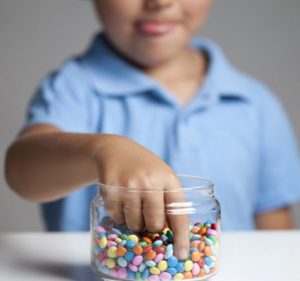Food Craving is Stronger, but Controllable, for Kids
[Source: Science Daily]

Children show stronger food craving than adolescents and adults, but they are also able to use a cognitive strategy that reduces craving, according to new research published in Psychological Science, a journal of the Association for Psychological Science.
“These findings are important because they suggest that we may have another tool in our toolbox to combat childhood obesity,” says psychological scientist and lead researcher Jennifer A. Silvers, a post-doctoral fellow at Columbia University in the laboratory of Professor Kevin Ochsner.
Most interventions aimed at preventing or reducing childhood obesity focus on changing the environment — by limiting access to soda, for example, or by encouraging physical activity.
“Such environmental interventions are clearly important, but sugary sweets and tempting treats cannot always be avoided,” Silvers explains. “If children as young as 6 can learn to use a cognitive strategy after just a few minutes of training, that has huge implications for interventions.”
Most interventions aimed at preventing or reducing childhood obesity focus on changing the environment — by limiting access to soda, for example, or by encouraging physical activity.
“Such environmental interventions are clearly important, but sugary sweets and tempting treats cannot always be avoided,” Silvers explains. “If children as young as 6 can learn to use a cognitive strategy after just a few minutes of training, that has huge implications for interventions.”
PediaStaff is Hiring!
All JobsPediaStaff hires pediatric and school-based professionals nationwide for contract assignments of 2 to 12 months. We also help clinics, hospitals, schools, and home health agencies to find and hire these professionals directly. We work with Speech-Language Pathologists, Occupational and Physical Therapists, School Psychologists, and others in pediatric therapy and education.
